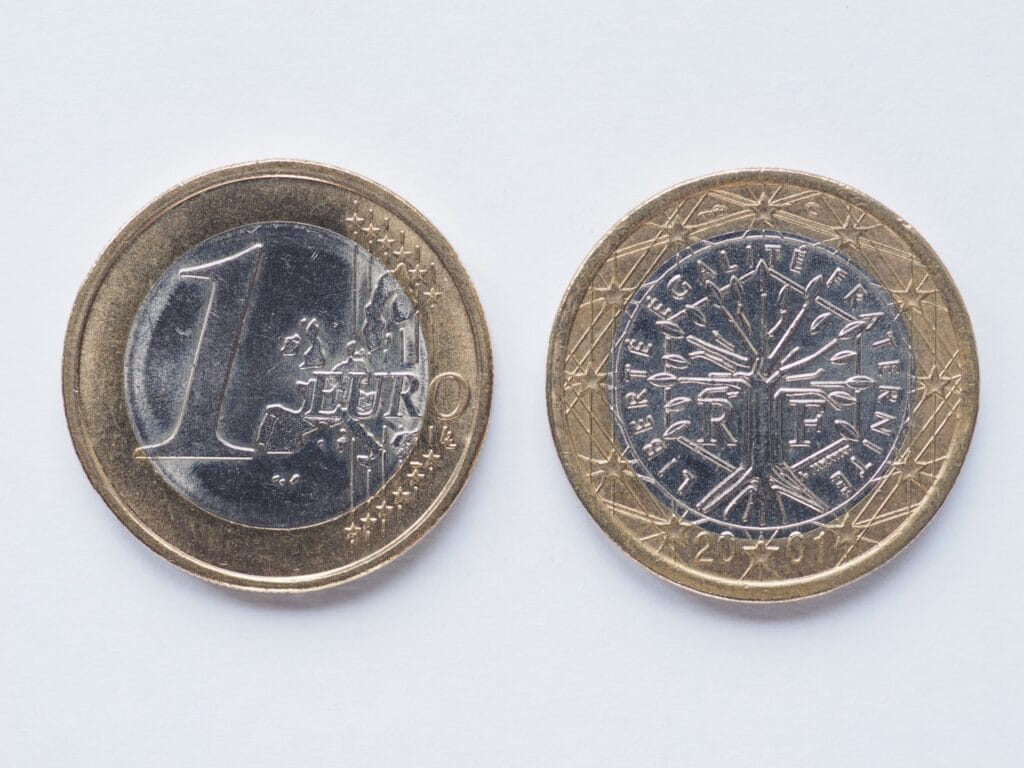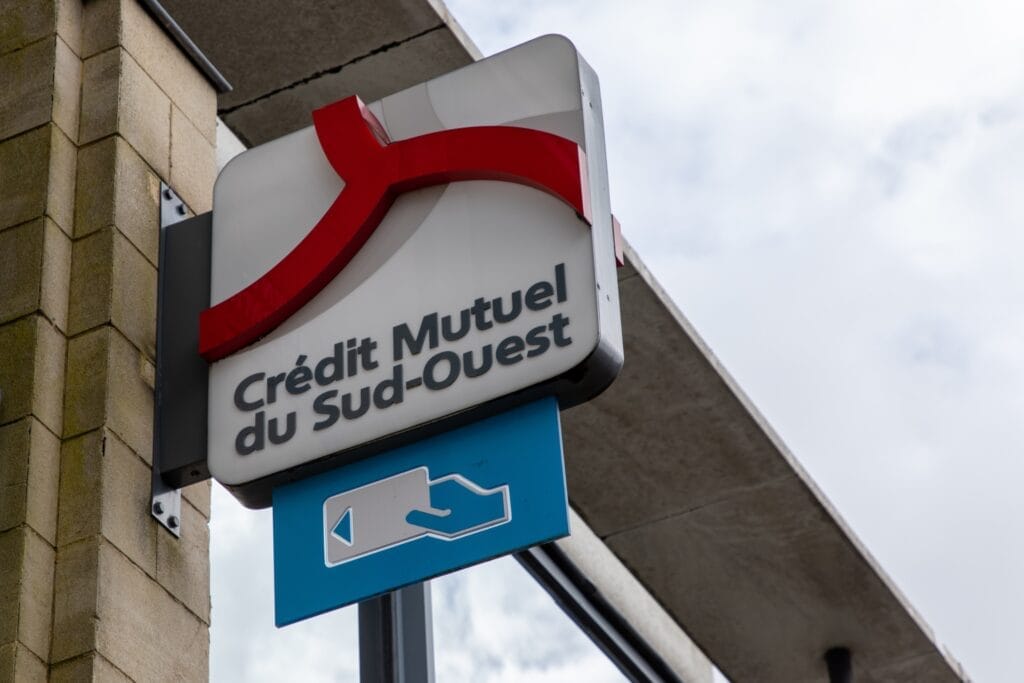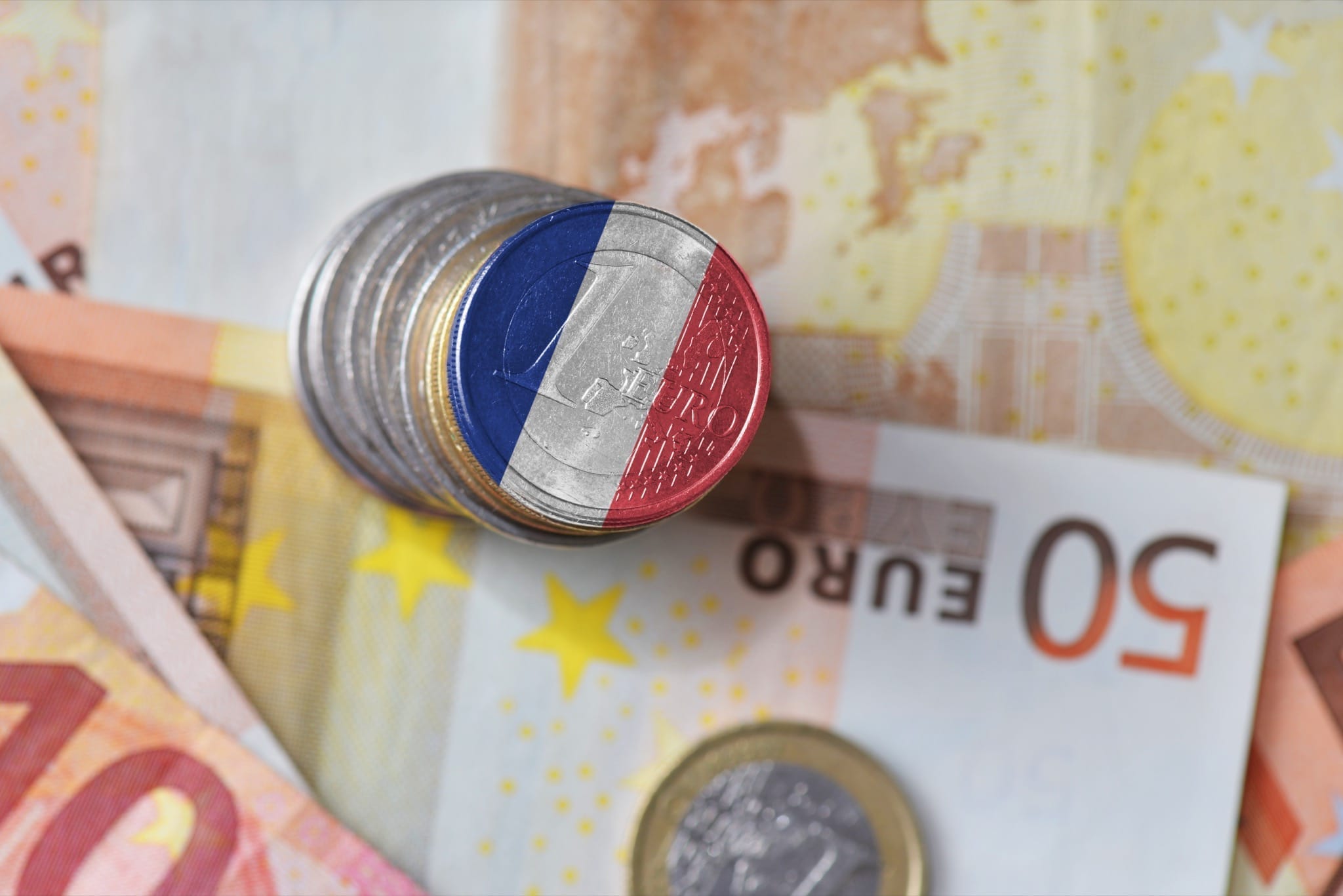France carries a unique charm that is synonymous with elegance and the arts, yet like everywhere else, the gears of its economy turn with the help of money.
High-Speed TGV’s from Paris to Lyon are quick and efficient, but someone needs to pay for them.
Yes, you will have to spend some cash to enjoy France. But does it have to be paper money or can you use your cards.
Read on for everything about money in France for travelers.
Currency in France
The currency in France is the Euro. Like many countries in Europe, France has used the Euro since 2002. The Euro is denoted by the € symbol. Don’t get confused in France – it comes after the number : 45 € instead of €45 like in many other countries.
If you have Euro coins or notes from Italy or Spain, you can use them in France without any issues. Euro notes are standardized across the Eurozone, but coins are different in each country.
French coins have unique designs on the reverse side, featuring symbols significant to France. Coins from any Euro country are acceptable, though.
Keep an eye out for commemorative coins such as the Paris Olympics one from 2024 or the Asterix anniversary edition.
In France, credit cards are widely accepted in most places but cash remains frequently used. Keep some cash on hand if you are visiting farmers’ markets or small villages where some smaller museums might ask for a couple of Euros entry.
Using Cash in France

In France, credit cards are widely accepted in most places but cash remains frequently used. Keep some cash on hand if you are visiting farmers’ markets or small villages where some smaller museums might ask for a couple of Euros entry.
Coffee is an important part of French culture. In Paris where locals drink their espresso at the bar there is often dual pricing. If you choose to enjoy your coffee seated at an outdoor table, the price may increase.
It’s worth checking the menu for these price differences before you sit down. This isn’t as common outside of Paris.
When visiting tourist attractions in France, credit and debit cards are generally accepted, but it’s always a good idea to have some cash on hand, particularly in smaller towns.
France is famous for its markets bursting with fresh and local produce. Whether you’re in the heart of Paris or a quaint Provençal village, visiting a farmers’ market is a sensory delight. Fruits, cheeses, and French saussage are a perfect picnic, grab a baguette from the baker. Be prepared to pay in cash at markets, as many vendors do not accept cards.
Of course, the larger cities with ‘Halles’, the covered markets, have more permanent vendors who all take cards.
When it comes to public transport, things are fairly straightforward. In larger cities like Paris and Lyon, metro and bus tickets can frequently be purchased using cash or card at automated machines and kiosks in stations.
However, for bus travel, it’s often best to get your ticket in advance, as purchasing a ticket directly from the driver may not be possible everywhere.
Using transport apps is standard in France now. Use tixiPASS which covers the whole country.
Using Credit Cards in France
Credit and Debit Cards are widely used in France. Most hotels and restaurants accept them, making it convenient for travelers. In some rural bed & breakfasts (chambres d’hôtes), cards might not be accepted. This is however, rare.
Most, probably all, French restaurants accept cards. Some crepe stands don’t take cards but even this is rare. However, wherever you’re spending more than 5€, expect the option to use a card. Keep in mind, though, that widespread availability doesn’t guarantee acceptance every time.
Taxis do accept cards. There are plenty of apps like G7 or Uber as well. Booking and paying in advance makes everything straightforward. Some Parisian drivers are known to take unnecessary detours with tourists, so an app helps prevent this.
Swiping Credit Cards in France
France uses the European system of chip cards paired with a PIN number, having moved away from outdated magnetic strip technology long ago. In fact in the mid 90’s they were the first country to go this route with their Carte Blue (a common name for ‘card payment’ in France)
Despite this, many machines still cater to older cards that require swiping, especially if you have an American card.
Of course, today, NFC technology is widely used for the convenience of tap-and-go transactions. Just like elsewhere, there’s usually a limit on contactless payments, which can vary by bank.
Check with your card issuer to be sure, as I have limits of €50 and €100 depending on the card. When it comes to making larger purchases, you might need to insert your card and enter your PIN the traditional way or swipe it.
Paying in Dollars on Credit Card
Many card machines in France will recognize that you’re using a foreign card and change language accordingly.
Beware!!! In tourist areas they often want to change currency as well.
If your bank is based in the US, for example, you’ll often see an option to pay in US dollars. This will show you the exact amount you’ll be charged in your home currency.
However, there’s a significant disadvantage to this. When the seller converts the currency, they usually include a large commission built into the exchange rate. ALWAYS PAY IN EUROS to get the best rate. Allow your card issuer back home to handle the exchange rate instead.
In my experience, I’ve never come across a better exchange rate from a card reader than what my own bank would provide.
Apple Pay and Google Pay in France
Is there anything more to say here – the prevalence of NFC payments has brought the use of Apple Pay and Google Pay to France.
Essentially you are using your regular bank card anyway, it just happens to pass through your phone and a middle man.
Paying by phone is common among young people and getting more common in older age groups too.
Exchanging Dollars in France
Clients always ask me where to exchange money, how to exchange money etc.
In France it is extremely expensive to change cash dollars into Euros. In the airports and central Paris there are tons of Travelex and Western Union money exchange places, but they offer terrible exchange rates.
Take note – exchange rates can be 10% worse than what you get on your card.
French Banks do not exchange money unless you have an account.
My recommendation is to use an ATM to get Euros, if you need them.
ATMs in France

When traveling in France, ATMs, known locally as distributeurs automatiques de billets, are widely available in cities and towns.
Most accept major credit and debit cards like Visa, MasterCard, and Cirrus, ATMs are typically found at banks, shopping centers, and busy public areas.
ATMs will normally offer you transactions in English as well.
Be cautious of independent ATMs in tourist-heavy areas, as they may charge higher fees. Stick to machines operated by banks to avoid these charges.
It’s always best to check with your home bank beforehand to confirm international use and potential fees. Always notify your bank before traveling to France to prevent any issues with card access.
Be aware of common ATM-related scams, such as card skimming, and always shield your PIN when entering it. If you think the ATM has been tampered with, find another. There will be one near by.
Tipping in France
Tipping in France, is a common practice, though not obligatory.
While service in cafes and restaurants is generally covered by wages, tipping is still appreciated and a great way to acknowledge good service.
Tipping for other services, such as taxis or hotel staff, follows similar guidelines. Rounding up the fare for taxi drivers or leaving a few euros for hotel porters and housekeeping staff is customary.
Keep in mind that while tipping in France is more relaxed than in some countries, it’s still a polite gesture to show gratitude for good service. Always hand the tip directly to the person you are thanking, and a warm “merci” goes a long way.
Service staff don’t expect a tip from you, but they do expect to have earned a certain amount from tips at the end of the day. Wages for service workers are low and most depend on their tips to have a comfortable life.
Tipping in Restaurants in France
In most places, it’s common to leave a small tip, typically rounding up the bill or leaving 5% to 10%, depending on the level of service.
In cafes, simply leaving your change or rounding up the bill by a couple of euros is acceptable. At higher-end restaurants, a more generous tip in the direction of 10% is common.
If a menu or the bill says ‘service compris’, then it does not mean that the tip is included. This is a common misconception. It is like the Italian coperta that covers the tablecloth and water etc.
Lots of people think it means the English ‘service’ but in my 10 years in the French hospitality business, I have never known a restaurant or bar that paid the staff based on that charge. It is the other meaning of the word service in French.
Service the French word, also means the items you use to serve food. Essential the dishes, serving spoons etc.
As mentioned, small tips are commonplace in French society but not obligatory. In restaurants, it is similar.
Tipping Guides and Drivers in France
Tipping drivers in France is not as common as in other European countries. Most people don’t tip taxi drivers as their fares have historically been almost extortionate.
Recently though, fares have, thanks to the competition of Uber and the like, come down to reasonable. In the countryside drivers are more likely to run their own business, in Paris the driver is more likely to be employed and need a supplement to his wages.
People are more likely to round up the fare than leave a generous tip.
Tipping in Bars in France
When I used to work in bars in France, I lived off my tips. Tipping culture in France isn’t the most generous, but when you get a euro for serving a round of beers, it adds up.
That was 20 years ago, and now people normally pay by card tips have fallen away. Unfortunately, wages have not gone up.
Tips are very much appreciated by the bar staff as they don’t always get paid as much as servers get paid in restaurants.
Rounding up the bill or a couple of euros is reasonable.
Summary
France uses the Euro and puts the € symbol after the number
Cards are King – not cash. France is not yet as cashless as the US, Ireland or Scandinavia, but on its way.
Tipping isn’t obligatory, but definitely appreciated. I would argue that it is necessary.
Service Compris on a menu does not mean that the staff get a percentage of each customer they serve.

